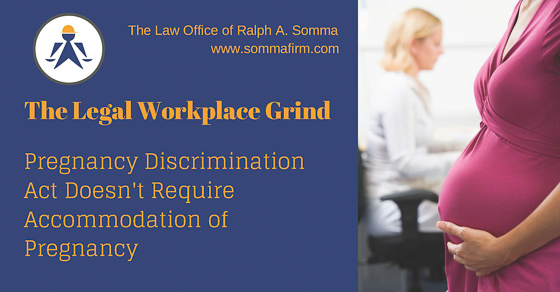The Pregnancy Discrimination Act (PDA), enacted in 1978, made it clear that discrimination in employment based on pregnancy, childbirth or related medical conditions violates the prohibition on sex discrimination found in Title VII of the Civil Rights Act of 1964.
What isn’t clear, however, is the meaning of a provision in the PDA which states, “women affected by pregnancy, childbirth, or related medical conditions shall be treated the same for all employment-related purposes … as other persons not so affected but similar in their ability or inability to work ….”
The U.S. Supreme Court was given an opportunity to clarify that provision in the closely watched case of Young vs. UPS. On March 25, 2015, it issued the much awaited decision in that case … and punted.
While advocates of women workers, who hoped the Supremes would extend the protections of Title VII, have some reason to be disappointed by the decision, all is not lost.
Peggy Young worked as a part-time driver at UPS. After suffering several miscarriages, Ms. Young again became pregnant. Her doctor advised her not to lift more than 20 pounds. However, UPS told Ms. Young she could not work with the lifting restriction. As a result, she was forced to remain at home during her pregnancy without pay or health insurance.
Ms. Young sued UPS claiming that its refusal to accommodate her pregnancy was a violation of the PDA. She argued that because UPS offered light-duty jobs to other employees – workers who were disabled, injured on the job or lost their Department of Transportation (DOT) clearance – the refusal to provide her an accommodation was discrimination based on pregnancy.
In a complicated opinion that raises more questions than it answers, the Court rejected Ms. Young’s position. It explained that requiring employers to provide pregnant employees all the benefits offered to all other employees would elevate pregnancy to “most-favored nation” status – something Congress did not intend when it enacted the PDA.
The Court also declined to adopt the guidelines of the U.S. Equal Employment Opportunity Commission (EEOC) which, if applied, would have carried the day for Ms. Young. Why would the U.S. Supreme Court ignore the guidelines of the federal agency established by Title VII and charged with the duty to interpret and enforce the anti-discrimination laws? Because the guidelines were not issued until after the Supreme Court accepted this case for review and were inconsistent with a position taken by the government in a similar case against the U.S. Postal Service.
So did UPS win? Well, not really.
In addition to rejecting the position of Ms. Young and the U.S. government, the Supreme Court also refused to apply the narrow interpretation of the PDA urged by UPS. Instead, the Court sent the case back for the appellate court to decide whether UPS intentionally discriminated against Ms. Young because of her pregnancy when it refused her accommodation request. In doing so, the Court instructed the lower courts to apply a newly formulated test – the details of which are mind-bending and the province of cases to come.
So what does this case mean for pregnant employees seeking an accommodation at work? Not much.
As the Supreme Court noted, the Americans with Disabilities Act (ADA), which was amended after Ms. Young’s case arose, now requires employers to accommodate even temporary disabilities that substantially limit an individual’s ability to lift, stand, or bend.
Therefore, while employers that provide certain categories of employees an accommodation may have to carefully consider whether they are obligated to offer those same accommodations to women with “normal” pregnancies, the ADA certainly requires that they offer employees with pregnancy-related impairments a reasonable accommodation of those temporary disabilities.
Please share your comments or questions below.
Ralph A. Somma is a Long Island, NY employment lawyer who handles cases involving discrimination in the workplace.
Click Here to schedule a FREE telephone consultation.

About the Author: Ralph A. Somma
Ralph A. Somma is an experienced employment lawyer from Long Island, New York. For over 25 years, Ralph has been working to enforce workplace rights in New York and Long Island.
Call today (631) 587-1699 or click here to schedule a FREE telephone consultation.


Recent Comments